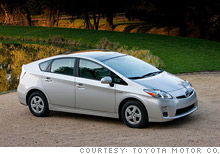Fuel standards: More mpg coming
New regulation requires all cars and light trucks sold in the U.S. to get an average of 35.5 miles per gallon by model year 2016.
 |
| Regulators expect more use of fuel efficiency technologies to result from the program, ranging from more efficient tires to more hybrid cars like the Toyota Prius. |
NEW YORK (CNNMoney.com) -- A final proposal for new fuel economy standards was unveiled Tuesday in a joint announcement by the Department of Transportation and the Environmental Protection Agency.
The regulation requires all passenger cars and light trucks sold in the United States to get an overall average of 35.5 miles per gallon by model year 2016. By that year, cars will be expected to average about 39 mpg and 30 mpg for trucks.
Current fuel economy standards for new cars are 27.5 mpg for cars and 23.1 mpg for trucks.
The new standards were originally announced in May by the Obama administration, before some details were finalized.
The agencies predict that the changes will ultimately save 1.8 billion barrels of oil by 2016. That's roughly what the country goes through in about 86 days, according to numbers from the Energy Information Administration.
Fuel economy will be increased gradually beginning with model year 2012 vehicles and continuing through model year 2016. The standards will apply only to newly purchased vehicles, not vehicles already on the road.
"American drivers will keep more money in their pockets, put less pollution into the air, and help reduce a dependence on oil that sends billions of dollars out of our economy every year," said EPA Administrator Lisa Jackson in a statement.
The proposed plan is expected to add about $600 to the cost of a car, administration officials said in May. That was on top of $700 added by other fuel economy increases passed by Congress in 2007. But consumers should be able to save enough in gas to make up for the cost. The EPA estimates that the new standards will save auto buyers about $3,000 over the ownership life of a new vehicle.
As it stands now, Corporate Average Fuel Economy, or CAFE, standards are administered by the National Highway Traffic Safety Administration, which is part of the DOT. The new rules will be administered jointly by the NHTSA and the EPA. The EPA is responsible for formulating the fuel economy figures shown on new car window stickers and used by shoppers. The EPA also regulates exhaust emissions.
The new proposal represents a big shift in how the government regulates fuel economy. Fuel economy standards used to be considered solely as away to reduce oil consumption. But these new regulations are also aimed at reducing greenhouse gas emissions like CO2.
Other pollutants can be cleaned out of a car's exhaust by its catalytic converter, but currently there is no way to remove CO2 from a car's exhaust. The only way to reduce CO2 is by reducing the amount of fuel that a car burns.
For years environmental groups pressured both the EPA and the powerful California Air Resources Board to regulate greenhouse gas emissions from vehicles. ![]()

